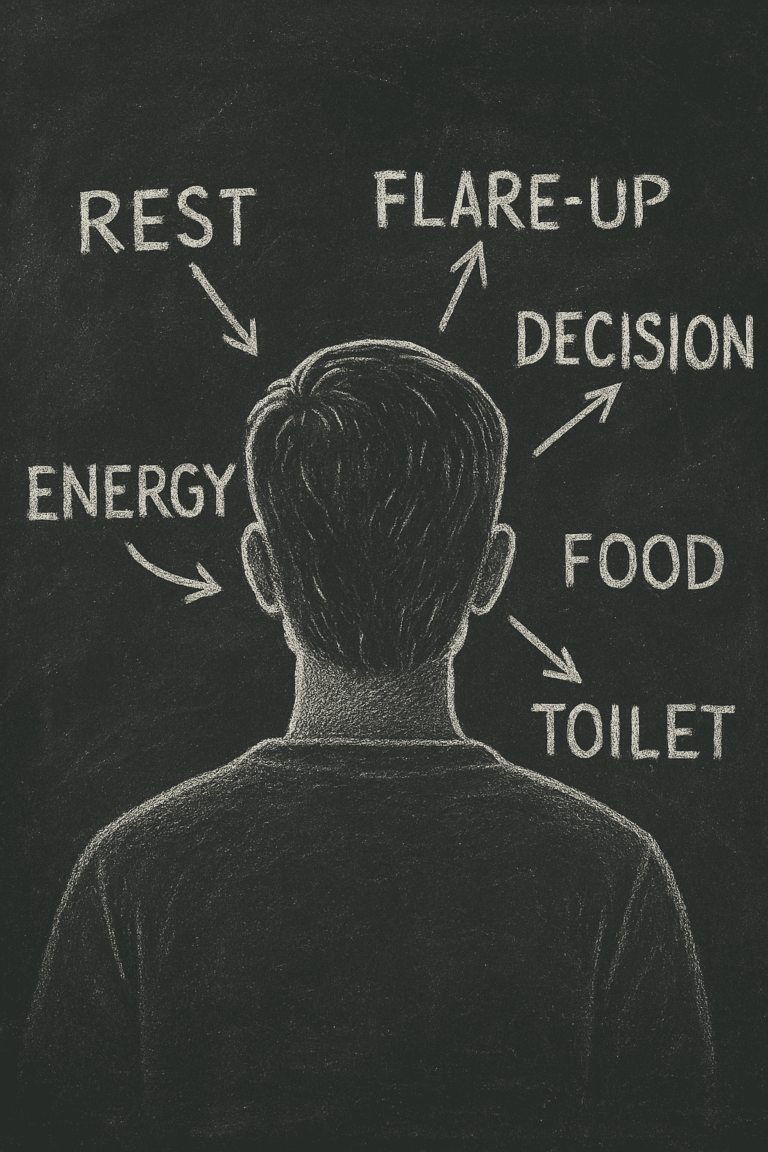If you’ve ever had to weigh up whether it’s safe to leave the house after eating breakfast, congratulations — you already understand how chronic illness changes you — and not just physically. You’re doing more complex risk analysis than most hedge fund manager and if you live with Crohn’s, this sort of micro-decision-making isn’t occasional. It’s constant. Welcome to the unofficial MBA in how chronic illness changes you — mentally, emotionally, and strategically.
Let’s get this out of the way: having Crohn’s isn’t a blessing in disguise. But it’s a real-world education in how chronic illness changes you — from the inside out. It’s uncomfortable, unpredictable, and wildly inconvenient. But it does have one side effect that rarely gets airtime — it forces you to adapt, improvise, and rethink the rules of daily life. And that, bizarrely, might just make you better at living.
How Chronic Illness Changes the Way You Think
Living with Crohn’s rewires your thinking. You start planning like a strategist with insider knowledge — always factoring in what others ignore.
- Planning to go out? Better factor in toilet access.
- Fancy a curry? Cue the 12-step risk assessment.
- Job interview at 10am? You’re up at 6 checking how your stomach feels — forecasting like the Bank of England but with more at stake.
What emerges is a kind of real-time cost–benefit analysis. We constantly juggle expected utility vs potential regret. Daniel Kahneman would be proud.
You intuitively learn about:
- Loss aversion: That thing where you’d rather avoid a bad outcome than chase a good one? That’s every food decision, ever.
- Sunk cost fallacy: Just because you’ve already planned something doesn’t mean it’s worth going through with if your gut says otherwise. Literally.
- Decision fatigue: When even choosing what to wear is exhausting because you’re mentally preparing for contingencies.
This isn’t theoretical. It’s survival. And it makes you a sharper, more agile thinker — one who knows how to adapt fast and spot patterns others miss.
Why Constraints Make You Smarter
There’s a reason NASA’s Apollo 13 team are revered in engineering circles. They solved the ultimate “square peg in a round hole” problem using duct tape, cardboard, and sheer panic. It wasn’t because they had more tools — it’s because they had fewer.

Living with Crohn’s is a crash course in resourceful thinking. You don’t get to play life on “easy mode.”
- Can’t eat certain foods? You invent new recipes.
- Can’t make a long commute? You negotiate remote work before it was trendy.
- Can’t rely on your energy levels? You prioritise like a productivity guru with a gun to their head.
We often think creativity is about freedom. It’s not. It’s about constraint. Limitations force ingenuity. They give you a reason to look at things sideways.
And that’s where people with chronic illness often quietly outshine everyone else — we’ve been forced to rewire our lives so many times, we start seeing life as a series of prototypes, not fixed systems. Everything’s in beta. And that’s a superpower.
What Illness Teaches You That School Doesn’t
There’s a kind of sharpness you develop when chronic illness calls the shots. It doesn’t show up on CVs — but it runs real life. It’s the ability to read a situation, adapt your behaviour, and know when to speak, act, or sit quietly with a hot water bottle.
Living with a chronic illness develops this kind of fast-tracked decision-making — it’s part of how chronic illness changes you every single day.
- You get better at managing people’s expectations.
- You know when to say no, and how to say it without guilt.
- You read your body’s signals with the finesse of a Formula 1 pit crew.
This is called contextual intelligence — the ability to make good decisions in uncertain, emotionally charged situations. It’s what separates decent leaders from brilliant ones.
And guess what? You’ve got it.
The Quiet Strength You Learn from Being Ill
There’s resilience, and then there’s resilience — the kind that doesn’t look like climbing mountains but quietly surviving a Tuesday with a flare-up, a work deadline, and no clean toilet in sight.
Crohn’s teaches a form of emotional durability that doesn’t get celebrated on Instagram but should be:
- You learn to sit with discomfort without panicking.
- You start recognising that not every situation needs to be “fixed” immediately.
- You develop a weird sort of peace with unpredictability.
Most people walk around with the illusion of control. People with chronic illness? We know better. We’ve trained for chaos, had a cup of tea with it, and politely asked it to bugger off. This makes you less reactive, more thoughtful, and—frankly—far less annoying to be around when plans change.
How Chronic Illness Teaches Tactical Patience
We live in a culture obsessed with “crushing it” and “hustling hard.” But anyone with a chronic illness knows that real strength often comes from not pushing through. Sometimes, the strategic move is to rest. Sometimes it’s to cancel. Sometimes it’s to say, “Not today, thanks.”
This is what military types call the OODA loop:
Observe, Orient, Decide, Act.
It’s about making decisions based on real-time feedback, not wishful thinking. And Crohn’s trains you in this loop whether you want it to or not.
You’re constantly gathering intel:
- How’s my energy today?
- Did that food sit right?
- What’s my gut telling me — literally?
And based on that data, you act. Not based on what you want to do. Based on what you can do.
That’s strategy, not weakness. And it’s more sustainable than pretending you’re a robot.
Questions People Actually Ask About Living with Chronic Illness
It often enhances resilience, empathy, adaptability, and real-time decision-making. You become more aware of your limits and more accepting of others’ needs.
Yes — the unpredictability and physical toll can increase anxiety and stress. But over time, many people also develop emotional resilience and strong coping strategies.
Absolutely. Limitations and unpredictability force people to problem-solve creatively and find new ways to function. Many report becoming more resourceful and inventive.
Routine, flexible planning, mindful eating, emotional check-ins, and reframing bad days as part of a broader pattern — not a failure.
Yes — living with an invisible condition often makes you more understanding of others’ hidden struggles and less judgmental.





